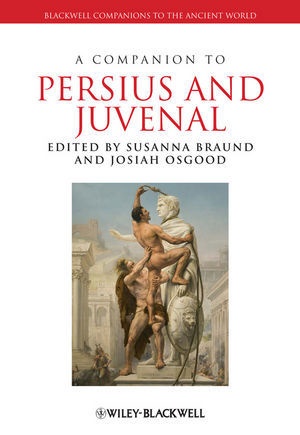Read more
Informationen zum Autor Susanna Braund is Professor of Latin Poetry and its Reception at the University of British Columbia. She is the author of Latin Literature (2002), a major edition of Seneca's De Clementia (2009), and translator of A Lucan Reader. Selections from Civil War (2009). Josiah Osgood is Professor of Classics at Georgetown University. He is author of Caesar's Legacy: Civil War and the Emergence of the Roman Empire (2006), Claudius Caesar: Image and Power in the Early Roman Empire (2011), and A Suetonius Reader (2011). Klappentext A Companion to Persius and Juvenal breaks new ground in its in-depth focus on both authors as "satiric successors"; detailed individual contributions suggest original perspectives on their work, and provide an in-depth exploration of Persius' and Juvenal's afterlives.* Provides detailed and up-to-date guidance on the texts and contexts of Persius and Juvenal* Offers substantial discussion of the reception of both authors, reflecting some of the most innovative work being done in contemporary Classics* Contains a thorough exploration of Persius' and Juvenal's afterlives "Graced with a 40-page bibliography, this 600-page work should become indispensable to classical scholars and anyone interested in satire. Summing Up: Essential. Upper-level undergraduates and above." ( Choice, 1 July 2013) Zusammenfassung Satire, written in the verse of heroic epic but focused on the evils of contemporary society, was ancient Rome's original contribution to world literature. Two great practitioners of this art, Persius and Juvenal, wrote under the early emperors. Inspired by their Republican predecessors, both radically reinvented the genre. Inhaltsverzeichnis List of Illustrations viii Abbreviations ix Notes on Contributors x Acknowledgments xv Introduction: Persius and Juvenal as Satiric Successors 1 Josiah Osgood Part I Persius and Juvenal: Texts and Contexts 17 1 Satire in the Republic: From Lucilius to Horace 19 Ralph M. Rosen 2 The Life and Times of Persius: The Neronian Literary "Renaissance" 41 Martin T. Dinter 3 Juvenalis Eques: A Dissident Voice from the Lower Tier of the Roman Elite 59 David Armstrong 4 Life in the Text: The Corpus of Persius' Satires 79 Catherine Keane 5 Juvenal: The Idea of the Book 97 Barbara K. Gold 6 Satiric Textures: Style, Meter, and Rhetoric 113 E.J. Kenney 7 Manuscripts of Juvenal and Persius 137 Holt. N. Parker Part II Retrospectives: Persius and Juvenal as Successors 163 8 Venusina lucerna: Horace, Callimachus, and Imperial Satire 165 Andrea Cucchiarelli 9 Self-Representation and Performativity 190 Paul Roche 10 Persius, Juvenal, and Stoicism 217 Shadi Bartsch 11 Persius, Juvenal, and Literary History after Horace 239 Charles McNelis 12 Imperial Satire and Rhetoric 262 Christopher S. van den Berg 13 Politics and Invective in Persius and Juvenal 283 Matthew Roller 14 Imperial Satire as Saturnalia 312 Paul Allen Miller Part III Prospectives: The Successors of Persius and Juvenal 335 15 Imperial Satire Reiterated: Late Antiquity through the Twentieth Century 337 Dan Hooley 16 Persius, Juvenal, and the Transformation of Satire in Late Antiquity 363 Cristiana Sogno 17 Imperial Satire in the English Renaissance 386 Stuart Gillespie 18 Imperial Satire Theorized: Dryden's Discourse of Satire 409 Josiah Osgood and Susanna Braund 19 Imperial Satire and the Scholars 436 Holt N. Parker and Susanna Braund 20 School Texts of Persius and...
List of contents
List of Illustrations viii
Abbreviations ix
Notes on Contributors x
Acknowledgments xv
Introduction: Persius and Juvenal as Satiric Successors 1
Josiah Osgood
PART I Persius and Juvenal: Texts and Contexts 17
1 Satire in the Republic: From Lucilius to Horace 19
Ralph M. Rosen
2 The Life and Times of Persius: The Neronian Literary "Renaissance" 41
Martin T. Dinter
3 Juvenalis Eques: A Dissident Voice from the Lower Tier of the Roman Elite 59
David Armstrong
4 Life in the Text: The Corpus of Persius' Satires 79
Catherine Keane
5 Juvenal: The Idea of the Book 97
Barbara K. Gold
6 Satiric Textures: Style, Meter, and Rhetoric 113
E.J. Kenney
7 Manuscripts of Juvenal and Persius 137
Holt. N. Parker
PART II Retrospectives: Persius and Juvenal as Successors 163
8 Venusina lucerna: Horace, Callimachus, and Imperial Satire 165
Andrea Cucchiarelli
9 Self-Representation and Performativity 190
Paul Roche
10 Persius, Juvenal, and Stoicism 217
Shadi Bartsch
11 Persius, Juvenal, and Literary History after Horace 239
Charles McNelis
12 Imperial Satire and Rhetoric 262
Christopher S. van den Berg
13 Politics and Invective in Persius and Juvenal 283
Matthew Roller
14 Imperial Satire as Saturnalia 312
Paul Allen Miller
PART III Prospectives: The Successors of Persius and Juvenal 335
15 Imperial Satire Reiterated: Late Antiquity through the Twentieth Century 337
Dan Hooley
16 Persius, Juvenal, and the Transformation of Satire in Late Antiquity 363
Cristiana Sogno
17 Imperial Satire in the English Renaissance 386
Stuart Gillespie
18 Imperial Satire Theorized: Dryden's Discourse of Satire 409
Josiah Osgood and Susanna Braund
19 Imperial Satire and the Scholars 436
Holt N. Parker and Susanna Braund
20 School Texts of Persius and Juvenal 465
Amy Richlin
21 Revoicing Imperial Satire 486
Gideon Nisbet
22 Persius and Juvenal in the Media Age 513
Martin M. Winkler
References 545
Index Locorum 587
General Index 603
Report
"Braund and Osgood s A Companion to Persius and Juvenalis an excellent book. Specialists, non-specialists, and students alike will find in this volume a comprehensive and spacious approach to these challenging poets." ( Phoenix , 1 May 2014)
"The whole book can be recommended, but I will single out a few chapters as especially interesting. . . In general, this is a useful book and a good first port-of-call for those new to the subjects." ( Religious Studies Review , 1 December 2013)
"This dense volume makes a stimulating contribution to the study of imperial Latin satire." ( Bryn Mawr Classical Review , 1 October 2013)
"Graced with a 40-page bibliography, this 600-page work should become indispensable to classical scholars and anyone interested in satire. Summing Up: Essential. Upper-level undergraduates and above." ( Choice, 1 July 2013)

